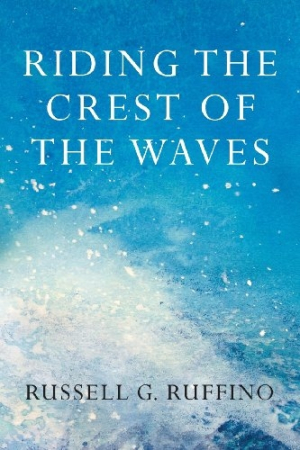Riding the Crest of the Waves
Daring to Believe What We Believe
Bound within fresh and inviting cover art, this is an inspirational challenge to Christianity in light of science and evolution.
After an extensive theological education and vocational ministry in the Episcopal Church, Russell G. Ruffino has written Riding the Crest of the Waves, a passionate endeavor to rearticulate the core of Christianity for those who find it “impossible to buy what Christianity—the church—advertises.” His audience is the seeking and discontent Christian, and he pulls no punches when discussing the traditional tenets of the Christian faith—the virgin birth, authority of scripture, original sin, and the literal resurrection of Christ, to name a few.
The subversion of these doctrines are, Ruffino writes, “conclusions Christians cannot escape” because of modern scientific revelations. He also treads heavily on the concept of American Christianity, a brand of patriotic faith that seeks to pardon the government’s actions because of a misinterpretation of the meaning of “one nation under God.” Yet, while many of his assertions may be too far out there for mainline believers, “Total and Unconditional Love,” as the ruling force in the life of the faithful, remains a key tenet.
The short chapters are organized thematically by the main points of the deconstruction of the traditional faith (such as “Jesus’s Corpse Did Not Come Back To Life”) and the assertions of new tenets (“Five Things Not Up For Grabs,” for example), which creates a precept-upon-precept overlay of his worldview—easier to grasp for readers. The strong writing is not a surprise given Ruffino’s learned background.
However, scripture is not used consistently; sometimes Ruffino uses biblical narratives as evidence for his claims while other times he disregards scripture, making this work perhaps less persuasive than those by biblical scholars who apply one approach across the board. But Ruffino knows this and explains early on that his reasoning comes from “personal study and experience” (not “biblical scholarship”). So Riding the Crest of the Waves becomes less theological treatment of sacred text and more an invitation to readers to challenge and rethink the meaning of Christianity in light of science and evolution—all bound within fresh and inviting cover art.
The tone, impassioned and absolute at times (“WRONG! It is horrible,” he writes as critique of the view that Christ’s death on the cross was redemptive suffering for mankind), can be unsettling, but Riding the Crest of the Waves will likely appeal to those on the fringes of the Episcopal Church, which, Ruffino writes, should lead the way in Christianity’s reformation. It’s likely this revision of fundamental church doctrine will ruffle more than a few feathers. However, those with a looser grip on Christian tradition may be open to and inspired by this new take.
Reviewed by
Heather Weber
Disclosure: This article is not an endorsement, but a review. The publisher of this book provided free copies of the book and paid a small fee to have their book reviewed by a professional reviewer. Foreword Reviews and Clarion Reviews make no guarantee that the publisher will receive a positive review. Foreword Magazine, Inc. is disclosing this in accordance with the Federal Trade Commission’s 16 CFR, Part 255.

